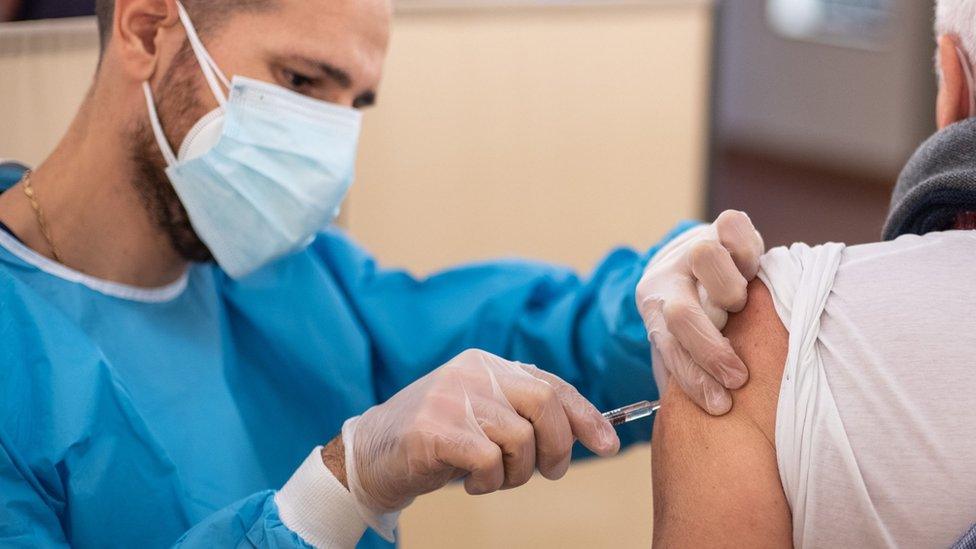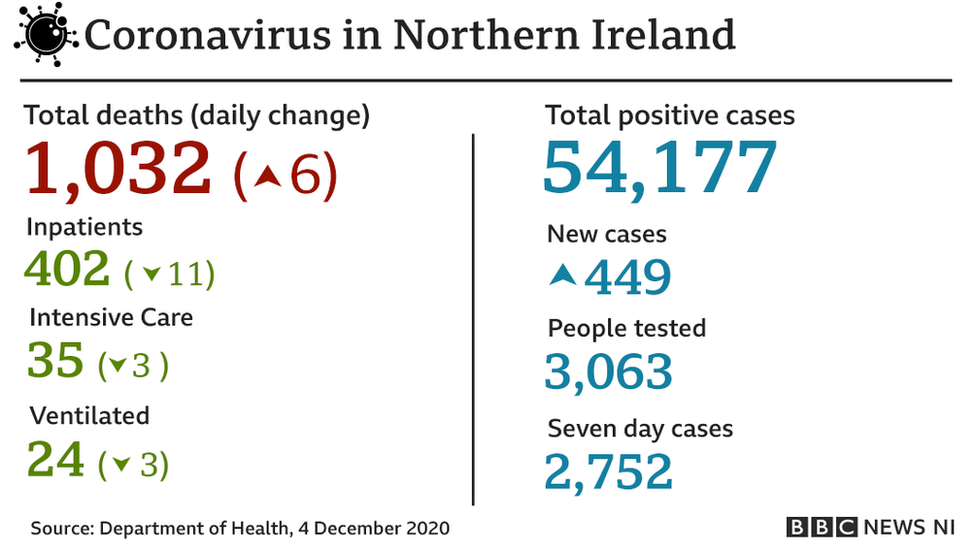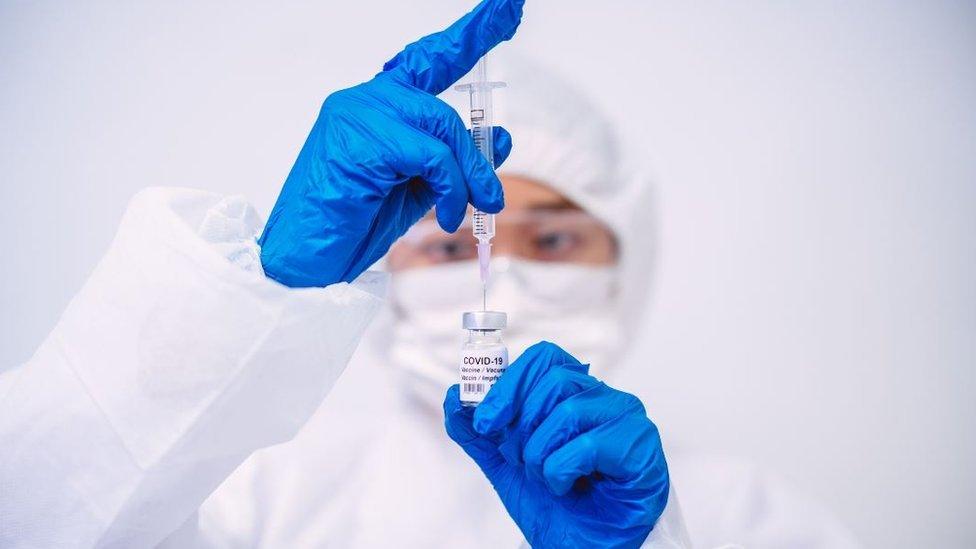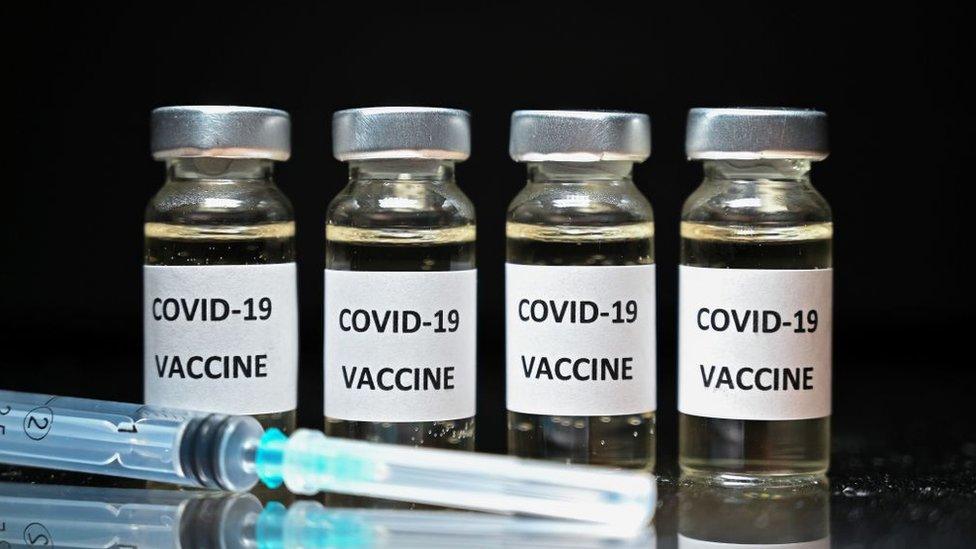Coronavirus vaccine: First doses of Pfizer jab arrive in NI
- Published

The first doses of the Pfizer-BioNTech Covid-19 vaccine have arrived in Northern Ireland.
Nearly 25,000 doses arrived in Belfast on Friday - it is hoped it will be the first of several deliveries this month.
Health Minister Robin Swann said confirmation of which groups will get the vaccine first is due next week.
There will be dummy runs at various locations, but it has been confirmed the first administration of the vaccine will be on Tuesday morning.
Mr Swann said there was "a long journey ahead of us but we can be optimistic".
He added: "Vaccinators will be the first to receive the vaccine, followed swiftly by priority groups.
"We are being guided on prioritisation by the Joint Committee on Vaccination and Immunisation.
"It has identified care home residents and staff and health and social care workers as priority groups."
Distribution of the vaccine would be "a massive logistical challenge", particularly in terms of rolling it out in care homes, added the health minister.

Another six people in Northern Ireland have died after testing positive for coronavirus, taking the Department of Health's recorded total of deaths to 1,032.
Another 449 people have tested positive for the virus.
In the Republic of Ireland six more Covid-19-related deaths were recorded, taking the country's overall tally to 2,086.
Irish health officials also reported that another 265 people have tested positive.


The arrival of the Pfizer-BioNTech vaccine in Northern Ireland is a massive box ticked.
But it doesn't just magic the virus away and some people might see the vaccine as an excuse to forget about the restrictions.
Given the existing two-week lockdown, the authorities anticipate that number of new infections will decline ever so slightly or remain stable until shortly before Christmas.
But with more of us out and about and mixing they are sure to rise again.
It is understood that if the so-called R-number can be maintained at 1.6 or below then intervention would not be required until the end of December or beginning of January.
However, if it was to rise as high as 1.8 then intervention would be required, possibly at end of December.
All of this depends on our behaviour and how closely we practice the Covid-19 guidelines.

To vaccinate care home residents in Northern Ireland, 12,000 doses of the vaccine are required.
The problem facing those responsible for rolling out the vaccination scheme is how to deliver it to care homes safely and effectively.
It is thought the seven vaccination centres that have been earmarked, including leisure centres and hospitals, will be used to roll out the vaccine to those care homes which are located nearby.
What will the vaccination process look like?
The vaccine must be stored at around -70C and will be transported in special boxes, packed in dry ice.
Once delivered, it can be kept for up to five days in a fridge.
On Wednesday the UK regulator the Medicines and Healthcare products Regulatory Agency (MHRA) said the jab, which offers up to 95% protection against Covid-19 illness, is safe.
It is thought Northern Ireland will receive about 1.5 million doses in total.
The UK is the first country in the world to approve the Pfizer-BioNTech vaccine for widespread use.

Patricia Donnelly, who is leading the vaccine rollout programme in Northern Ireland, said the fact the Pfizer-BioNTech vaccine had to be stored at a very low temperature and came in large packs meant it was more practical to take the people receiving it to larger centres.
"We hope that we will start to deploy it next week - we're aiming for early in the week but we can't confirm that until we have all our final arrangments in place," she told BBC Radio Ulster's Evening Extra.
"Because we don't have a limitless supply of the vaccine we're also looking at where our priorities are for this.
"Next week we have a definite plan to vaccinate the vaccinators."

In other coronavirus related developments:
More Covid-19 restrictions will be needed "around Christmas" if the number of cases spikes due to next week's relaxation of measures, BBC News NI understands Stormont ministers were advised
Restaurants, cafes, hotels and some pubs in the Republic of Ireland reopened on Friday in a further easing of Covid-19 restrictions
The weekly number of Covid-19-related deaths in Northern Ireland has fallen for the first time in two months, according to statistics agency Nisra
One of NI's leading performers has criticised the NI Executive for not allowing venues and theatres to reopen safely
Universities in NI are to move all teaching online by 9 December to allow students to return home for Christmas

- Published2 December 2020

- Published20 February 2021
